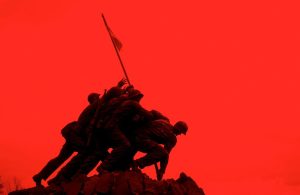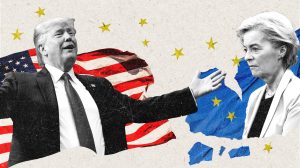If you’ve read The Restaurant at the End of the Universe by Douglas Adams, you’ll immediately recognise what happened to the Europeans last month. They went into the Total Perspective Vortex. This is a torture device designed by a mad scientist which reveals your insignificance in comparison with the rest of the universe. Almost all who enter are annihilated. That understanding is just too terrible to survive.
Before the Europeans endured the Vortex, they believed they could fight Donald Trump over his tariffs. They thought they could organise their own defence to fight against Russia should that ever become necessary. Immediately after he won the German elections in February, Friedrich Merz declared that Europe would have to become independent of the US. When he became chancellor, he swiftly realised the impossibility of his statement.
The photo released by the White House last week, with Donald Trump sitting behind his desk and the European leaders arrayed on chairs before him, tells us how the attempted insurrection of the European minions ended. Perched uncomfortably on their chairs, the politicians look like unruly school children called in for a dressing down. Alexander Stubb, the Finnish president, took notes like a pupil eager to write down what the headmaster was saying. Giorgia Meloni, the Italian prime minister, arms crossed, looked like she had been given a detention. Friedrich Merz and Emmanuel Macron tried to look important — like the head boys. All you can see of Trump is his fist.
I cannot imagine François Mitterrand, Helmut Kohl, or Margaret Thatcher squirming on their seats before the US president’s desk. But, then, no former president would have dared do to them what Trump has just done to their successors.
Things were to only get worse for the Europeans. Last Thursday, America confirmed the final version of the EU trade agreement — though it was more diktat than settlement. The US imposes 15% tariffs on all European goods, and 50% for steel and aluminium. In turn, the EU agrees to eliminate all tariffs on US goods, and open up its markets to all American cars and agricultural products. The EU also agreed not to apply its anti-trust policies to US digital companies. That’s what you get when the other side has put a gun on the table.
It is not true, as some people say, that the EU negotiated badly. Indeed, as the British can testify, they are good negotiators. But you can’t unleash a trade war against the country on which you rely for your nuclear umbrella. The US has always been the imperial power in the transatlantic relationship and now they are using that power against us. Europe has no choice but to acquiesce.
And yet, the EU has always considered itself to be the envy of the world — morally and intellectually superior, and cultured. The EU supports multilateral institutions. It pretends to support human rights whenever this is expedient. It has a customs union, a single market. and a single currency.
But this image doesn’t sit easy with the political and economic reality of modern Europe. France has a dysfunctional government that does not know how to pass the budget; it sits on the precipice of a sovereign debt crisis. Italy has been on that brink for even longer. The best thing you can say about Meloni is that she successfully managed to stay off the radar screens of the bond market vigilantes. But the Italian economy today remains fundamentally weak. Germany’s industrial model has collapsed. It relied critically on five events not happening: Donald Trump getting elected for the first time, Brexit, the Ukraine war, China’s aggressive industrial policies, and Trump getting elected for a second time. Spain’s growth looks better superficially, but this is only because of immigration. Productivity growth is as low as everywhere else in Europe. The UK, too, languishes under the same problem.
We have to remember, though, that Europe’s collective weakness has been a choice, not something forced upon us by adverse circumstances, or foreign powers. When the EU started the monetary union in 1999, it squandered the various opportunities it presented. It could have taken the path towards fiscal and capital markets union. That would have allowed the euro to become a competitor to the US dollar. They did not even try. On defence, a very practical step would have been the creation of a procurement agency to eliminate the wasteful duplication of weapons systems amongst Nato countries. No dice.
The EU could have expanded the single market, which was only seven years old in 1999, into services. Here they tried but failed. Fearful of the Polish plumber, France managed to kill the project. In each case, national politics intruded and ultimately prevailed. Angela Merkel rejected a common sovereign debt instrument because she feared a rebellion by conservatives in her party. Italy and Germany were keen to protect their fragile banks from takeovers from abroad. The EU we have today is a lowest common-denominator union — unfit for a world dominated by aggressive powers.
There were plenty of times Europe could have changed direction, and addressed its weaknesses. The euro crisis was one such moment. So was Trump’s first election and the Brexit referendum, both in 2016. But instead, each time, the Europeans chose complacency. They did the minimum needed to keep the euro afloat and failed to correct the imbalances in the European economy. After the Brexit referendum, they thought the British would hold a second one because that is what happens in Europe when they get the wrong result. And when Trump got elected, they decided to sit it out, and wait for better times.
For me, and a few others, the advent of a monetary union was not about money, but geopolitical power. The EU would never match the US in its military capabilities. But it was an opportunity to become the largest global economic power.
Again, they choose the path of weakness. I am not criticising Trump for exploiting this. He was elected on an agenda that puts his country first and his allies second. He is clearly setting Europe adrift. The Europeans cravenly crawl to him and plead for mercy. While he enjoys the attention, it won’t change his politics. The imbalance in trade policies is worse now than it was on April 2, when Trump announced the Liberation Day tariffs. The Europeans bought into this “Trump always chickens out” nonsense. In the end, it was the Europeans who chickened out.
I have been a pro-European all my life. But a Europe of coordinated subservience is not one worth having. The whole idea of European integration was to address collective action problems. The EU no longer does that.
Instead, it set out on a path of no return. This has led it a place of low growth, high debt, and a lack of political majorities that support change. Large and increasing portions of European citizens live off welfare. They have no interest in reforms that will invariably lead to a cut in their income. Demography plays havoc with democracy. In Germany, for example, I cannot identify a single political party with a coherent agenda for reform. In the UK, too, there is not one political party that has given serious thought to a post-Brexit economic model. In their decline, European countries are astonishingly similar. The UK, France and Germany are all currently discussing wealth and property taxes as a last and desperate measure. If, and when, this is implemented, they will end up with even less growth. They are running out of ideas.
Europeans once believed that if the crisis were big enough, they would do the right thing. Recent history has shown that this is not so. We have had the euro crisis, Trump, Brexit, a pandemic and Ukraine. As each crisis hit, Europe got weaker.
Of course, Europe is still cultured and beautiful. It will remain one of the world’s favourite tourist destinations. But a museum can’t feed 500 million people who take free education, and a high standard of living for granted.
So here we are, stuck in the Total Perspective Vortex, and not enjoying the experience. In the book, there was one survivor of the torture instrument. Zaphod Beeblebrox, who considered himself to be the most important being in the universe, came out smiling. I suspect that Trump, too, would emerge with his view of his own importance confirmed and reinforced.
But as for the Europeans, they were always smaller than they thought they were.
Click this link for the original source of this article.
Author: Wolfgang Munchau
This content is courtesy of, and owned and copyrighted by, https://unherd.com and its author. This content is made available by use of the public RSS feed offered by the host site and is used for educational purposes only. If you are the author or represent the host site and would like this content removed now and in the future, please contact USSANews.com using the email address in the Contact page found in the website menu.






